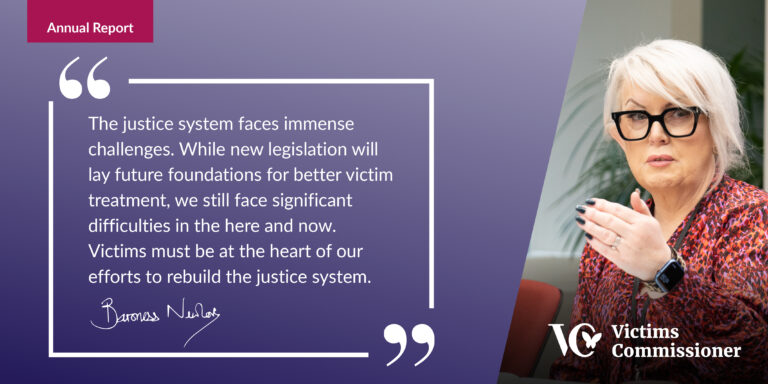The justice system must listen to victims, not just talk at them

In her 2023/24 Annual Report, Baroness Newlove reflects on the year's key issues and successes.
This article was first featured in Baroness Newlove’s 2023/24 Annual Report, published on 10 October 2024.
Returning as Victims’ Commissioner has been an honour and a privilege. I know first-hand the challenges victims face as they navigate the criminal justice system. Their challenges are my challenges, and their struggles my priority.
Seventeen years after the tragic loss of my late husband, Garry, my determination to ensure all victims are treated with respect and provided with essential support throughout their criminal justice journey remains as strong as ever.
The passage of the Victims and Prisoners Act (2024) onto the statute book was a milestone, and I am proud to have played a pivotal role in its development. The previous government invited me to return as Victims’ Commissioner to help scrutinise its passage through Parliament. My return was motivated by a desire to ensure it delivered on its promise: a justice system where victims feel heard, respected, and supported at every step.
While the Victims and Prisoners Bill in its original form had much to commend it, the consensus was clear: it needed to go further. We required a transformation in how victims are treated in our justice system, not more tinkering around the edges. I worked closely with a wide range of stakeholders and my fellow peers from all parties and none to strengthen the Bill, while maintaining close working with Ministers and officials, to whom I am grateful.
The Bill emerged much stronger as a result, with strengthened accountability mechanisms and key concessions, but essential amendments I championed – to safeguard the rights of sexual violence victims and extend support to marginalized groups, such as those affected by anti-social behaviour and homicides overseas – were unsuccessful. I am pleased the Bill has become law; this represents significant progress. However, my dedication to these causes continues.
The past year has been a period of significant progress and persistent challenges. Record-breaking Crown Court backlogs and a deepening prison population crisis have underscored the urgent need to place victims at the heart of our criminal justice system. As Victims’ Commissioner, I am committed to amplifying their voices and I’ve published two victim surveys during my term, including a landmark survey in August. Surveying over 3,000 individuals across England and Wales, it revealed widespread victim frustration with police inaction, delays, and poor communication.
While some victims shared positive experiences when navigating the criminal justice system – a testament to dedicated and hard-working criminal justice professionals – it’s clear that too many were left behind, often feeling frustrated and unsupported. This was the largest survey ever undertaken by my office and I am committed to repeating this vital exercise later in the year.
Alongside these victim surveys, I have also published research mapping victim advocacy provision in England and Wales. I have long been a proponent of advocates and for good reason: this research underscored the vital role of advocates in supporting victims, helping them stay informed, engaged and protected. As Crown Court backlogs lengthen and victim withdrawal rates rise, advocates become even more crucial. My research underscores this need and provides recommendations to strengthen their provision.
For me, anti-social behaviour is not a statistic. It’s a lived experience, one I share with countless victims across the country. My 2019 report, Living a Nightmare, exposed the harsh reality faced by victims. It made a number of recommendations. Sadly, little progress has been made in addressing the issues I identified five years ago. My updated review revealed a persistent pattern of neglect: victims were often ignored, deprioritised, and passed from one agency to another. Systemic change is required to improve how victims of anti-social behaviour are treated and supported by statutory agencies. My new recommendations offer a clear path to improve support and treatment for victims of anti-social behaviour. I hope – this time – they will be adopted by government in full.
My office is embarking on crucial research into the full impact of court delays. By directly engaging with victims, victim service providers, and justice system personnel, this research will examine the broader impact on victim services and the overall effectiveness of the justice system. By analysing best practices in areas like communication and case listing, I aim to identify solutions that ensure victims’ needs are at the forefront of any government strategy.
The criminal justice system undeniably faces immense challenges. While new victim legislation is set to lay the foundations for better victim treatment in future, we still face significant difficulties in the here and now. The voices of victims must be at the heart of our efforts to rebuild the justice system.
The justice system must listen to victims, not just talk at them. It should share information willingly and with sensitivity. It should give victims a voice, make them feel like a participant and not an onlooker. A justice system that does all of the above will help heal some of the victim’s wounds. It can bring catharsis, regardless of the outcome. It can also give other victims the confidence to come forward and report crimes committed against them.
On the other hand, a justice system that does none of these things will only add to the trauma of the crime and create disillusionment, with victims and witnesses simply walking away saying: never again.
